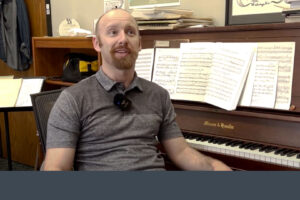Are the chances of being victim of a crime in America substantially less than they were 20 years ago? Do electric vehicles really yield all of the benefits that proponents claim? When playing in a tennis match, how does the time at which you challenge an umpire’s call affect your odds of winning the game?
These questions are among the 2,000 research topics that will be addressed when the world’s leading faculty, researchers and practitioners meet in Austin Nov. 7-10 for the annual Institute for Operations Research and the Management Sciences (INFORMS) meeting.
The conference brings together problem solvers in engineering and business to discuss topics in operations research and management science (OR/MS), the application of advanced analytical methods to help make better decisions.
An estimated 4,000 people are expected to attend this year’s event, held at the Austin Convention Center and hosted by The University of Texas at Austin’s Cockrell School of Engineering and McCombs School of Business for the first time.

“Having the [meeting] in Austin will greatly increase the visibility of UT’s faculty and students among academics and practitioners worldwide and gives us an opportunity to showcase our programs in operation research, industrial engineering, management science and related fields,” says Jonathan Bard, a professor in the university’s Mechanical Engineering Department and the chair of this year’s event.
During the conference, a cluster of 14 sessions will be devoted to William W. Cooper and the research area he created: data envelopment analysis. Cooper, 96, is a professor emeritus at the McCombs School and is widely recognized as a father of OR/MS.
Operations research and management science have long been misunderstood by those outside of the discipline, but through organizations like IBM Corp. and Microsoft Corp., the analytics field has experienced a rebirth in recent years. Professionals use OR/MS for everything from dynamically setting the price of airline seats to using analytics and statistics to recruit the best baseball player during a draft.
Such creative thinking led Cockrell School of Engineering Professor John Hasenbein to study when it is most advantageous to challenge an umpire’s call during a tennis match.
Inspired by a New York Times op-ed piece last year that argued players did not use challenges enough, Hasenbein and a graduate student decided to apply their mathematical modeling discipline and analyze the argument from the perspective of trying to win and use challenges judiciously.
Hasenbein will give a talk on the Markov decision process model they developed, which, using a range of data, found if players are extremely weak or strong compared to their opponent, they have a better chance of winning if they challenge calls more consistently and earlier in the game than if they are of equal ability as their opponent.
University of Texas at Austin Professor David Morton will present the methodology used in his research on where to station nuclear material detectors along the United States border.
He and fellow Cockrell School faculty Elmira Popova and Erich Schneider developed an optimization model for the federal government that helps predict behavior by acting like a game in which the nuclear smuggler is smart, has multiple entry points into the U.S. and wants to avoid being caught.
In addition to research presentations, the conference will feature 11 plenary and keynote talks on this year’s conference theme “energizing the future.”
Charles G. Groat, director of the university’s Center for International Energy and Environmental Policy, and Joan B. Woodard, executive vice president emeritus of Sandia National Laboratories, will share their ideas of what the energy system of the future will look like.
Other highlights from the conference:
Crime: What is Your Risk of Being a Murder Victim? Professor Arnold Barnett of Massachusetts Institute of Technology says U.S. homicide rates have dropped to half their levels in the 1980s, suggesting the risk of being a homicide victim has dropped, too. But patterns are not always what they seem to be. Hear Barnett’s analysis of murder-risk in the 50 largest U.S. cities. Monday, Nov. 8, 11 a.m.-12:30 p.m.
Cell Phone Legislation: Evaluating the Impact of Legislation Prohibiting Hand-held Cell Phone Use While Driving. Sheldon Jacobson, a professor at University of Illinois at Urbana-Champaign, and colleagues ask if legislative efforts to restrict hand-held cell phone use while driving are really helping. Tuesday, Nov. 9, 4:30-6 p.m.
Escaping a Terrorist Attack: Mass Escape From Large Public Events. Douglas A. Samuelson, president and chief scientist at InfoLogix, reviews new developments in simulation modeling that will lead to better planning and preparation for disasters at large events. He will summarize the status of several projects under way for the U. S. Secret Service. Wednesday, Nov. 10, 3:30-5 p.m.
William W. Cooper’s Impact: William W. Cooper, professor emeritus at the McCombs School, has spent his career focused on problem-driven research. An entire cluster will be held as a tribute to his research influence on and leadership in the field of OR/MS. “I’ve never seen a track devoted to a person, but there aren’t many people that start an area that becomes a keystone in virtually all business school education around the world,” said Patrick Brockett, a professor at McCombs. Cooper continues to work and publish his research.



